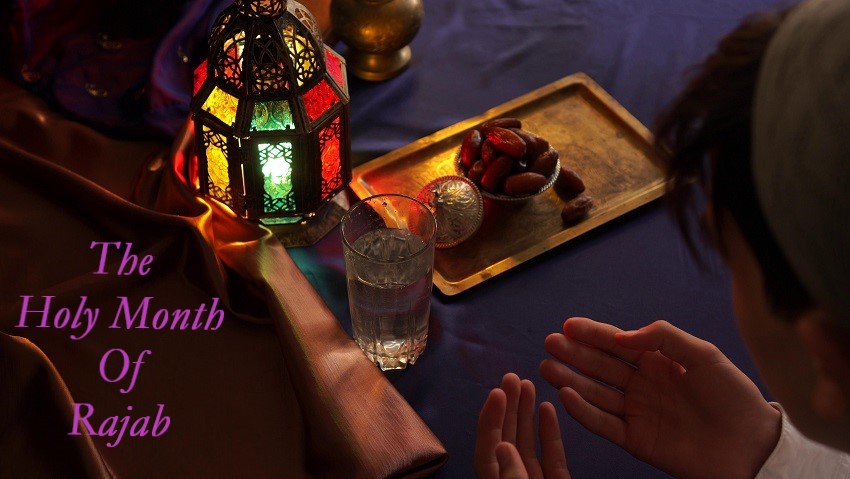The month of Rajab is considered one of the holy months in Islam. Many Muslims consider performing Umrah in Rajab. Here are some interesting facts about the importance of Rajab, overall as well as with respect to Umrah pilgrimage.
In Islam, it is believed that Allah created 12 months, among which four are sacred. During these four months, battles are prohibited and engaging in warfare is considered blasphemous. In these months, one’s deeds significantly impact the balancing scales. Therefore, one must refrain from committing any wrongs during the sacred months.
Rajab Meaning
Rajab, the seventh month of the Islamic calendar, is one of the four sacred months. Its name is derived from the classical Arabic verb ‘Rajaba,’ which means ‘to respect.’ Also known as Rajab al-Murajjab (translated as greatly revered and magnified), this month has several virtues according to Muslims. The number of days during Rajab is contested as some people believe that this month has 29 days while others maintain it consists of 30 days.
According to saint Abd al-Qadir, Rajab is made of three letters – Ra, Jeem and Ba. Ra stands for Rah’matullah, meaning the mercy of Allah); Jeem stands for Ju’duAllah, meaning the generosity of Allah, and the last, Ba stands for Bir’uAllah, meaning the kindness of Allah.
Rajab Month Importance
Rajab holds special significance in the Islamic culture and is also referred to as ‘Rajab – the separate month’. It stands distinguished from the other three sacred months that fall together. Owing to its virtues, it is called by 18 different names, some of which are Al Mu’tahir (the cleanser), Al Mu’ali (the elevator), Al Mudar (of the tribe of), Al-Murajjab (the revered), and Al-Asamm (the deafening).
During this month, Muslims increase good deeds and refrain from doing anything that is not recommended by Islam. The benefits of Rajab month are as follows:
1. It is the month of Allah
Rajab is believed to be the month of Allah, which is why Muslims pay great attention to it. The Prophet said that Rajab is the month of Allah and the Prophet’s month is Shaban, whereas Ramadan is the month of Ummah. Because of this reason, Muslims devote their time in prayers and helping the needy during Rajab as the good committed during the month of Allah earns rewards and blessings.
2. Key historic events took place in the month of Rajab
Rajab is the month when many historically significant events took place, including:
- The noble parents of the Prophet were married during the sacred month of Rajab.
- Aminah, the mother of the Prophet, conceived him during this holy month.
- The miraculous night journey and ascension of the Prophet through the heavens also happened during the 27th night of Rajab. This day is remembered as ‘Isra miraj day’.
Virtues Of Rajab : What to Do During This Sacred Month?
In the holy month of Rajab, one should try to perform the following acts to earn the blessings of Allah:
A. Keep peace
During this sacred month, there is a cessation of hostility and all wars are put on pause. The month is also known as Rajab al-Asamm, meaning silent Rajab as fighting is prohibited in this month. Around this time, committing any wrong is a grave sin that displeases Allah and earns disapproval.
B. Observe Istighfar
For those seeking forgiveness from Allah, Rajab is a great opportunity. The Prophet said Rajab is the month of absolution, so seek forgiveness from Allah. This month is also called al-Asabb in Islam, referring to the flood of divine mercy. Anyone who prays to the almighty during this time with a pure heart and asks for mercy is pardoned.
C. Fasting during Rajab
Observing fast during this month brings rewards and virtues. It is believed that the great Prophet said any person who fasts for a day during Rajab will be rewarded from Ridwan, an angel in heaven. For such people, the doors of hell will close, and from them, the wrath of God will be distanced.
D. Perform Sadaqah, or Charity
Offering charity to those who need it not only earns rewards in this life but also in the journey hereafter. So helping others and offering charity is recommended.
Does Performing Umrah During Rajab Earn Great Rewards?
Rajab is a holy month in Islam because of which many people believe that undertaking the sacred pilgrimage of Umrah during this time of the year will earn extra rewards. However, there is no mention of any Hadith said by the Prophet concerning the rewards of performing Umrah in Rajab.
In the past, noble men including Umar ibn al Khattab, Uthman Ibn Afaan and Ali Ibn Abi Talib performed Umrah during Rajab. This inspired their followers to follow suit. It has also been reported that devout ancestors often used to do Umrah in Rajab after completing Hajj to maximise rewards.
Fasting in Rajab
Though there is no genuine report on fasting in the month of Rajab, Prophet Muhammad (PBUH) told Muslims to fast in the four sacred months. As per Abu Dawood, the Prophet (PBUH) repeated himself three times. Hence, it is said that most of the first-generation Muslims fasted during Rajab. Some of the popular and noble names include Ali Hassan Al Basri, Ibn Umar, Sufyan Al Thawree, and Abu Ishaak Al Siba’i. Therefore, fasting in Rajab carries immense benefits and is equal to fasting in any of the other three sacred months.
Rajab month fasting days
As narrated by Abu Hurairah, the Prophet (PBUH) used to fast Monday and Thursday. In his words “Oh messenger of Allah, we see you fasting Monday and Thursday?” He replied “Indeed on Monday and Thursday, Allah forgives every Muslim, except the two who have animosity between them. Allah declares, leave them until they make up.” (Ibn Ma’jah)
As reported by Abu Hurairah, the Prophet (PBUH) said, “Actions are raised and declared on Mondays and Thursdays and I would love that my actions would be raised and declared whilst I am fasting.” (Tirmidhi)
Hence, the preferred Rajab month fasting days are Monday and Thursdays or Wednesday and Thursdays. It is said that the Prophet himself used to fast during these days of the sacred months, hence most people follow the same.
Fasting on the 27th Rajab
There is no notable document stating that Muslims should fast on the 27th of Rajab. Further, one can’t create a fasting day on their own. Hence, people should only fast on 27th Rajab if it falls either on a Monday or a Thursday. The blessings of fasting on the 27th of Rajab (Monday or Thursday) will equal the rewards of fasting on any Mondays or Thursdays of the sacred months.
Prophet Muhammad on Rajab said:
“O People! Time has gone back to how it was at the time Allah created the Heavens and the Earth. A year has twelve months, four of which are sacred, three consecutive, Dhul-Qi’dah, Dhul-Hijjah, Muharram, and Rajab.”
–[Al-Bukhari]
Prepare for the month of Ramadan
Rajab is a sacred month that precedes the blessed month of Shaban and the holy Ramadan month. Muslims should use the month along with Shaban to prepare for the long fasting day of Ramadan. They should start eating nutritious food along with maintaining good behavior. The good deeds of Rajab and Shaban are highly rewarded with multiple benefits of Ramadan. People should also start saving for the Zakat Al Fitr and start donating money in Charity. Further, they can start reciting and understanding the verses of the holy Quran for offering prayers more spiritually in the month of Ramadan.
Views of the Islamic scholars
Some people also maintain that the Prophet himself performed the journey of Umrah during Rajab, but this was denied by Aishah, Prophet Muhammad’s wife. The spiritual guides believe that she said that the Prophet did not perform Umrah in Rajab and never except for when she was with him.
Spiritual guides are of the opinion that one can undertake Umrah in Rajab as the minor pilgrimage is a holy journey and performing it in any month earns blessings from the almighty. Moreover, people should always be keen on performing good/holy deeds during sacred months.
Suggested read: Ramadan In Makkah: Places To Visit And Things To Do
The Month Of Rajab 2022 FAQs
What is the significance of Rajab?
It holds exceptional importance in the Islamic culture and is likewise alluded to as Rajab - the different month. It stands recognized from the other three hallowed months that fall together. Attributing to its ethics, it is called by 18 unique names, some of which are Al Mutahir (the chemical), Al Muali (the lift), Al Mudar (of the clan of), Al-Murajjab (the adored), and Al-Asamm (the stunning).
What is the importance of 13 Rajab in Islam?
Thirteenth Rajab, the birth date of the lion of Allah, Hazrat Ali Ibn-e-Abi Talib (R.A) Hazrat Ali (R.A), considered as perhaps the most daring human throughout the entire existence of humankind, was the main kid to perceive Hazrat Muhammad (S.A.W) for his Prophethood.
Is Rajab mentioned in the holy Quran?
Allah has referenced with regards to this night in the Quran, and the above ayah describes the night when Prophet Muhammad (S.A.W) was taken from Makkah to Jerusalem by Angel Gabriel (A.S).
Why is Rajab called Rajab?
Every single one of the Islamic months has importance. Their implications additionally have stories behind them and why they were named by such a name. Rajab was named by this name since individuals celebrated for the current month and enjoyed reprieves from any fierce exercises among one another.
Does performing Umrah during Rajab earn great rewards?
It is a blessed month in Islam due to which many individuals accept that endeavor the holy journey of Umrah during this season will acquire extra rewards. Nonetheless, there is no notice of any Hadith said by the Prophet concerning the compensations of performing Umrah in Rajab.
What is a suitable Rajab month dua?
Prophet Muhammad PBUH asked his followers to recite, Allahumma barik lana fi Rajab wa Sha’ban wa ballighna Ramadan, on the sighting of Rajab moon. It means, O Allah make the months of Rajab and Sha’ban blessed for us and let us reach the month of Ramadan.
What happened in the Rajab month?
It is the month when the Prophet traveled from the holy Kaaba in Makkah to Al Aqsa in Jerusalem and finally ascended to heaven with Angel Gabriel. Also, in Rajab, Saladin liberated Jerusalem from Crusaders.
What are the recommended things to do in Rajab?
It is among the four sacred months in Islam; therefore, perfoming good deeds such as fasting, praying, and self introspection is highly rewarding things to do.








